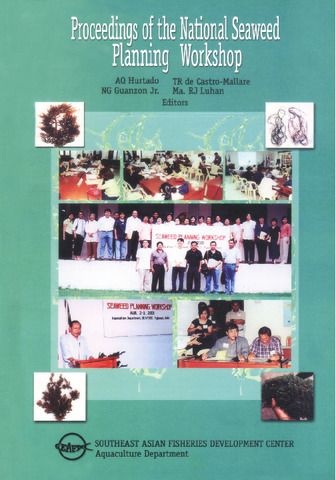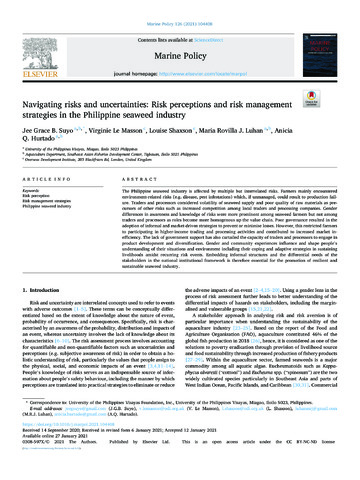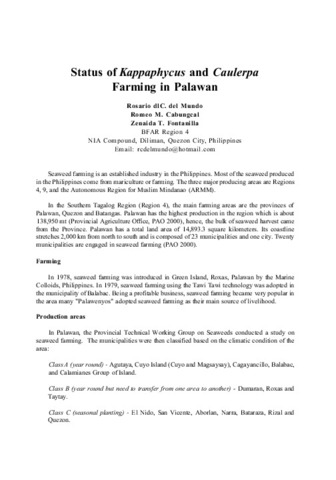Proceedings of the National Seaweed Planning Workshop held on August 2-3, 2001, SEAFDEC Aquaculture Department, Tigbauan, Iloilo
| dc.contributor.editor | Hurtado, A. Q. | |
| dc.contributor.editor | Guanzon Jr., N. G. | |
| dc.contributor.editor | de Castro-Mallare, T. R. | |
| dc.contributor.editor | Luhan, Ma. R. J. | |
| dc.date.accessioned | 2013-12-04T03:27:56Z | |
| dc.date.available | 2013-12-04T03:27:56Z | |
| dc.date.issued | 2002 | |
| dc.identifier.citation | Hurtado, A. Q., Guanzon Jr., N. G., de Castro-Mallare, T. R., & Luhan, M. R. J. (Eds.). (2002). Proceedings of the National Seaweed Planning Workshop held on August 2-3, 2001, SEAFDEC Aquaculture Department, Tigbauan, Iloilo. Tigbauan, Iloilo, Philippines: SEAFDEC Aquaculture Department. | en |
| dc.identifier.isbn | 9718511571 | |
| dc.identifier.uri | http://hdl.handle.net/10862/1816 | |
| dc.description | Seaweed forming is one of the major livelihoods among coastal communities in the Philippines, particularly to some 180,000 families in the Sulu Archipelago. In 1999, the Philippines exported more than 35,000 tons of dried seaweeds (US$ 44M) making the country the 4th largest producer of seaweeds and 8th largest producer of carrageenan in the world. However, improper post-harvest management (i.e. cleaning; drying by salting or steaming; adulteration of seaweeds with sand, dust, and dirt for added weight; storage; and baling) reduces quality, which eventually dictates the market price. The National Seaweed Planning Workshop was organized by a collaborative effort of SEAFDEC Aquaculture Department (AQD) and the Bureau of Fisheries and Aquatic Resources (BFAR) for the formulation of a Code of Practice for the Seaweed Industry in order to minimize industry malpractices and to sustain its position in the international market. The National Seaweed Planning Workshop invited several seaweed industry associations, and representatives from the government, NGOs and academic and research organizations conducting seaweed research and development to discuss the research and development programs of the different participating agencies, identify and validate problems and concerns of the seaweed industry, and agree on strategies of solving problems in seaweed farming like disease management, post-harvest facilities and research funding. This proceedings documents the National Seaweed Planning Workshop. Hopefully, the contributions would help in the drafting of the Code of Practice in attaining a sustainable seaweed industry. | en |
| dc.format.extent | 100 p. : ill. (some col.) | en |
| dc.language.iso | en | en |
| dc.publisher | Aquaculture Department, Southeast Asian Fisheries Development Center | en |
| dc.subject | Gracilaria | en |
| dc.subject | Caulerpa | en |
| dc.subject | Sargassum | en |
| dc.subject.lcsh | Marine algae culture -- Congresses. | en |
| dc.subject.lcsh | Marine algae culture -- Philippines. | en |
| dc.subject.lcsh | Seaweed culture -- Philippines -- Congresses. | en |
| dc.title | Proceedings of the National Seaweed Planning Workshop held on August 2-3, 2001, SEAFDEC Aquaculture Department, Tigbauan, Iloilo | en |
| dc.type | Book | en |
| dc.type | Conference publication | en |
| dc.subject.asfa | carrageenans | en |
| dc.subject.asfa | seaweeds | en |
| dc.subject.asfa | conferences | en |
| dc.subject.asfa | seaweed culture | en |
| dc.subject.asfa | agar | en |
| dc.subject.scientificName | Kappaphycus | en |





